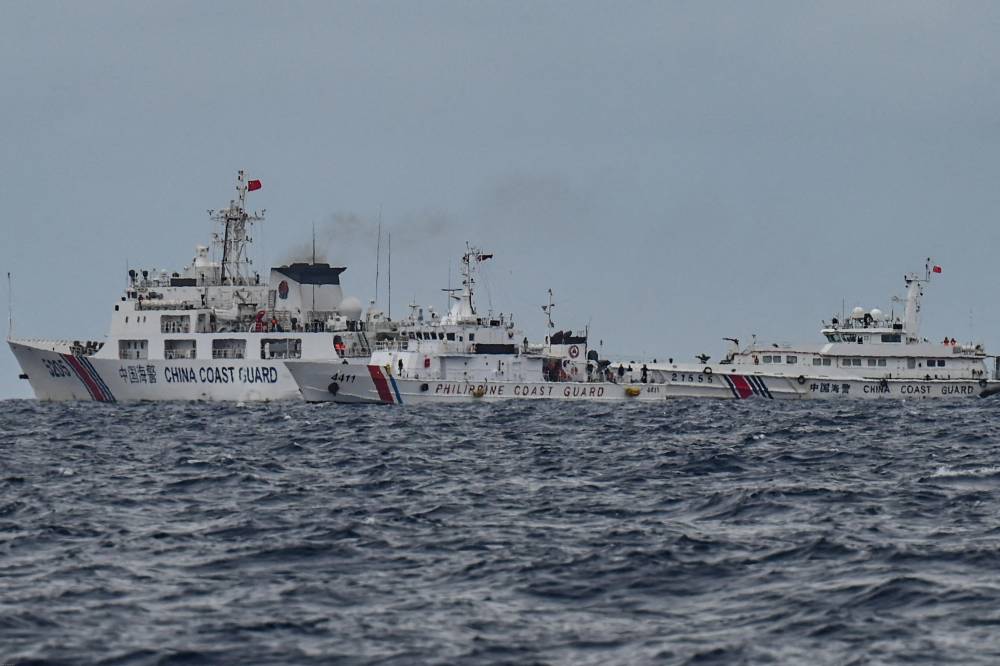Chinese coast guard lingers off Zambales, Occ. Mindoro

The Chinese coast guard is maintaining its presence off the coast of Zambales province and in the waters off Occidental Mindoro province’s Cabra Island in the West Philippine Sea (WPS), well within the country’s 370-kilometer exclusive economic zone (EEZ), according to the Philippine Coast Guard (PCG).
PCG Commodore Jay Tarriela, the PCG spokesperson for the WPS, said the BRP Teresa Magbanua on Friday challenged the presence of China Coast Guard vessel 3304 (CCG 3304), telling it that it did not have “legal authority to patrol” the Philippines’ EEZ and ordered the ship to leave the area immediately.
The CCG 3304, according to Tarriela, was spotted about 190 km off Zambales while the PCG was distributing supplies to fisherfolk in the area.
“The PCG has firmly communicated to CCG 3304 the necessity of maintaining a safe distance from Filipino fishing boats, stressing that its presence poses a significant threat to the safety of both the fishermen and their vessels,” Tarriela said.
The Teresa Magbanua’s radio message was ignored by CCG 3304. The Chinese vessel was later replaced by the 165-meter CCG 5901, the largest coast guard vessel in the world and nicknamed “The Monster” because of its size.
CCG ships began “intrusive patrols” in the waters off Zambales on Jan. 1, with the presence of CCG 5901.
“The Philippine Coast Guard remains steadfast in its commitment to protect the rights and welfare of Filipino fishermen and ensure the security of the nation’s exclusive economic zone, all while adhering to international law and avoiding provocative actions,” Tarriela said.
The CCG 5901 was told by the Teresa Magbanua to leave the area as it had no legal authority to patrol the Philippines’ EEZ.
In reply, CCG 5901 said it was “performing law enforcement duties on jurisdictional waters of the People’s Republic of China.”
“Your order was wrong …,” it said, adding that “China firmly upholds its territorial sovereignty and maritime rights and interests in South China Sea.”
On Saturday, US maritime expert Ray Powell said nine CCG vessels were spotted in the Philippines’ EEZ, including the Chinese ship near Cabra Island.
Powell, director of SeaLight, a program of Stanford University’s Gordian Knot Center for National Security Innovation that keeps track of Chinese activities in the WPS, said CCG 3104 and CCG 3301 were conducting “intrusive patrols” 56 km off Cabra.
In January last year, Chinese warship 570 shadowed Philippine and US Navy warships conducting maritime drills off Cabra.
On Saturday, Powell said the Chinese monster ship was spotted “midway between Scarborough Shoal and Luzon” while CCG 5202 passed within 6 km off Philippine-occupied Lawak Island.
The reported presence of Chinese ships in the WPS comes as Philippine authorities arrested six Chinese individuals allegedly engaging in espionage, targeting the country’s military and naval sites.
Chinese spies
Philippines security officials announced last week the arrest of five of the six suspected Chinese spies who were allegedly monitoring Manila’s resupply missions in the WPS.
Armed Forces of the Philippines chief Gen. Romeo Brawner Jr. said the Philippines’ rotation and resupply missions may have been compromised as early as 2023, based on the National Bureau of Investigation record of the group’s activities.
Powell told the Inquirer on Saturday that it was “not surprising” that China was spying on the Philippines.
“Not only have we seen Chinese spies caught in other countries (including the US), we’ve seen plenty of indications that China was aware of Philippine missions well before they happen,” he said.
“These indications have included everything from the movement of Chinese ships ahead of unannounced Philippine missions to PRC propaganda accounts posting social media announcements of what the Philippine Coast Guard was going to do in the future.”
On Friday, National Security Adviser Eduardo Año said the Philippines had “pursued peaceful and diplomatic measures consistent with our desire to deescalate rising tensions” in the WPS.
According to him, Manila’s actions in the WPS “remain compliant” with international law and “established norms” of cooperation and diplomacy.

















